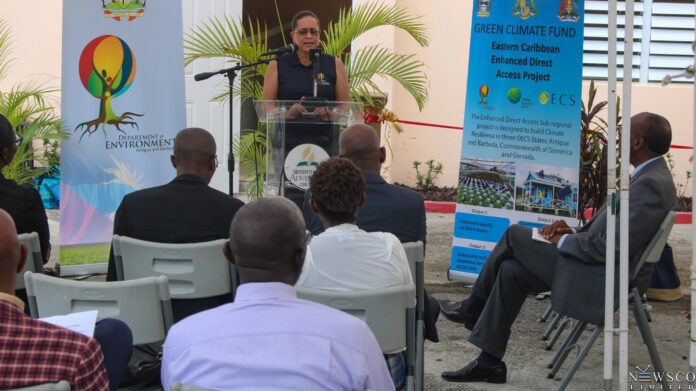
By Samantha Simon
[email protected]
The Department of the Environment has announced the successful completion of upgrades to enable Tindall Temple Seventh-Day Adventist Church to be used as an emergency shelter.
The Valley Road church was one of four selected through a call for proposals. The chosen churches had to own their property and agree to serve as such a facility.
Progress at the other three churches varies, with the Bible Speaks Church and Steps to Christ Church not yet near completion.
On the other hand, the Cashew Moravian Church is nearing completion, with all activities finished except for the installation of a lift.
Funded by the Green Climate Fund, the project aims to strengthen institutional capacities and enhance the climate resilience of at least five percent of the population in the Eastern Caribbean, with an emphasis on inclusivity and equity.
In October 2021, the Department awarded the Tindall Temple Church a US$225,000 grant to transform it into a fortified hurricane shelter.
The upgraded facility now serves the residents of Nut Grove, Golden Grove, Grays Hill, and surrounding communities, while also supporting various community development initiatives.
The project encompassed several key activities, including reinforcing existing structures, particularly the roof, to withstand severe weather conditions.
A 12-kwh solar renewable energy system, complete with solar panels, batteries, and a grid-interactive inverter, was also installed to provide substantial energy cost-savings, and ensure power availability during emergencies.
The RE (renewable energy) systems help to reduce electricity costs. This approach allows for the churches to keep their emissions low and benefit the planet, while carrying air conditioning units.
“Further, the community can benefit from energy when the grid is down. If the grid is down, they will be able to even charge EVs (electric vehicles),” Director of the Department of the Environment, Diann Black-Layne, explained.
Windows and doors were also upgraded and reinforced to withstand extreme weather, and water harvesting systems were implemented to ensure a reliable water supply during emergencies.
The project faced several challenges, with Black-Layne noting, “The major challenges were the time needed to pass the regulations to process the loans, Covid-19 and the resulting 100-200 percent increase in costs, the challenge of getting the local staff to respect the procedures of the donors so that we can stay in compliance, and the capacity of the staff to implement the project.”
The Enhanced Direct Access (EDA) project is part of a larger initiative ongoing in Grenada, Dominica, and Antigua and Barbuda, with support from the Organisation of Eastern Caribbean States (OECS) that includes accreditation of regional entities, grants to community shelters, and a revolving loan programme.
In Antigua and Barbuda, the department is piloting green procurement, focusing on the Cashew Hill and Briggins areas, providing grants to churches in these locations, and offering revolving loans in the Briggins and Cashew Hill watersheds.
“The DOE is taking a step back and learning from this experience with the churches,” Black-Layne stated.
“We are going to redesign the project to allow for the DOE to include more churches while reducing costs. We are not sure when this will happen, but we are working as fast as we can.”



